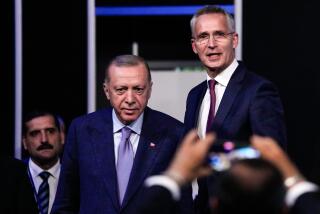U.S. Decries Turkish Chief’s Trip to Libya
- Share via
WASHINGTON — In language rarely used with close allies, the United States ripped into Turkish Prime Minister Necmettin Erbakan on Tuesday for his controversial trip to Libya over the weekend, accusing him of trying to diminish Libyan leader Moammar Kadafi’s role in international terrorism and stating that the incident will “have an impact on U.S.-Turkish relations.”
In remarks to reporters here, State Department spokesman Nicholas Burns characterized Erbakan’s comments at a news conference Sunday in Tripoli, the Libyan capital, as “untrue . . . off base and . . . unwarranted.”
During that news conference, Erbakan stood next to the Libyan leader and reportedly first spoke out against the United States, then criticized Israel and finished off by describing Libya as a victim of terrorism.
“We strenuously disagree with remarks from Prime Minister Erbakan, which tried to diminish the role and the responsibility that Moammar Kadafi has for international terrorism, which tried to hide the fact that Moammar Kadafi and his agents are responsible for the deaths of hundreds of people, including hundreds of American citizens,” Burns said. “We find it very curious and, frankly, objectionable that a Turkish leader would make apologies for a Libyan.”
The incident “does have an impact on U.S.-Turkish relations,” Burns warned.
His comments marked the second straight day that the United States criticized the Turkish premier’s visit to Tripoli and the highly charged remarks he made there. Libya is under U.N. sanctions for its role in the support of terrorism. The United States holds Libya and its unpredictable leader responsible for the 1988 bombing of a Pan American Airways jumbo jet over Scotland that claimed 270 lives.
Despite the conspicuously strong nature of Burns’ remarks, State Department sources said there would be no official protest to Turkey over the incident. Burns indicated that the United States is eager to move the issue out of the spotlight and work to repair the damage quietly. “Now we’re looking forward to a private dialogue with the Turkish government,” Burns said.
Remarks by Kadafi at the same news conference--calling for a Kurdish homeland and chastising Turkey for its close ties to the West--also landed Erbakan in hot water on a sensitive domestic issue and gave his three-nation African trip all the earmarks of a debacle. Kurdish nationalists have fought a long, bitter campaign against Turkey to carve out just such a homeland.
Since Sunday, Erbakan has drawn the wrath of a large section of the Turkish population and resignation calls from influential political opponents, including former prime ministers Mesut Yilmaz and Tansu Ciller.
The 70-year-old leader of the Islamic, religious-based Welfare Party became prime minister in June on a pledge to steer Turkey closer to the Muslim world. Iran was one of the first nations he visited. But his current trip, which includes meeting with Nigeria’s military government, another international outcast, drew criticism from his opponents at home and raised concerns among Turkey’s allies in the West even before he departed.
More to Read
Sign up for Essential California
The most important California stories and recommendations in your inbox every morning.
You may occasionally receive promotional content from the Los Angeles Times.













